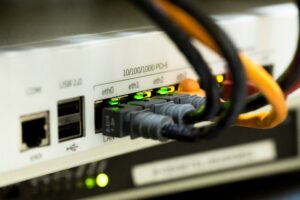
Image source link: https://unsplash.com/photos/black-smartphone-duMttyw2Xc0
Ever wondered about the safety of your data when you’re on your iPhone or iPad? In our interconnected world, where your phone acts as a crucial link, privacy threats are prevalent. That’s where a Virtual Private Network (VPN) steps in.
A VPN is like your personal digital cloak, safeguarding your online activity by encrypting your data and hiding your IP address. This tool can help you dodge content restrictions, bypass network limitations and protect your internet connection from data thieves.
But, it’s important to remember that not all VPNs are the same. Your choice can significantly impact your privacy and security.
This guide will walk you through the importance of VPNs on iOS, why they’re essential, and how they can offer you peace of mind in this digital age.
The Importance of VPNs on an iPhone
When you use a VPN, it masks your IP address, making your online activity anonymous. It’s like going undercover online, keeping your personal information safe from data snoopers.
Here’s the kicker: A VPN not only encrypts the connection between your iPhone and the internet but also protects you from cybercriminals. It’s your shield in the vast digital world.
When you secure your iPhone with a VPN, it allows for private connections over the open internet.
Whether you’re checking your bank account on public Wi-Fi or shopping online, you’ll have peace of mind knowing your digital privacy is secured.
VPN Apps and Native VPNs: What’s the Difference?
VPN apps are software you download from the App Store. They’re user-friendly, offering straightforward setup and automatic connection to a VPN server. They often come with extra perks like IP randomization and dedicated IPs.
On the other hand, native VPNs are built-in features in iOS. They require manual setup and a server to connect to. While they provide robust security, they lack the convenience and extra features of VPN apps.
In short, if you’re tech-savvy and prefer more control, go for native VPNs. But if you favor ease and additional features, VPN apps are ideal for you.
The Advantages of Using a VPN on iOS
Why should you consider using a VPN on your iOS? The reasons are numerous and compelling. A VPN, or Virtual Private Network, provides a secure, encrypted connection to the internet, safeguarding your online activities.
Here are four key advantages:
- As previously discussed, a VPN encrypts your data, protecting it from potential cyber threats when you’re connected to public Wi-Fi.
- With a VPN, your IP address is hidden, ensuring your online activities remain anonymous.
- A VPN allows you to access content that may be restricted in certain geographical locations.
- ISPs often slow down your internet speed when you’re streaming or downloading. A VPN helps prevent this, ensuring smoother internet usage.
Setting up a VPN on iOS Devices
Now, let’s delve into how you can set up a VPN on your iOS device.
First, you’ll need to download a reputable VPN app from the App Store. Once downloaded, open the app and sign up or log in.
You’ll then select a server in your desired location – this is crucial if you’re aiming to bypass geo-restrictions.
After selecting a server, there will be an option to connect. Click on it and voila, your VPN is set up and your connection is secure.
Always check if the VPN is working properly. You can do this by looking for a VPN icon on your device’s status bar.
Here’s the step-by-step guide to manually set up a VPN on an iPhone or iPad, using the IKEv2 protocol, which is a solid choice for security and speed:
- Tap on your iPhone’s “Settings” app to open it.
- Scroll down and select “General.”
- Tap on “VPN & Device Management.”
- Choose “VPN.”
- Press “Add VPN Configuration.”
- Pick “IKEv2” as your VPN type.
- Fill in the VPN’s details as provided by your chosen VPN service.
- Add your login information to authenticate.
Also, remember Apple’s iOS 15 update includes something similar to a VPN called Private Relay. It’s for people with iCloud+ subscriptions and adds privacy, but it’s not quite the same as a VPN.
It uses two separate internet stops to keep your IP address and what you do online more private. Even with this feature, using a full VPN for extra security might still be a smart move.
Key Considerations When Choosing a VPN
When choosing a VPN for your iPhone or iPad, you should consider several key factors to ensure you’re getting the best protection and value. It’s not just about selecting any VPN, you need to be smart about it.
- Security and Privacy Features: Confirm if the VPN has strong encryption protocols, a zero-logs policy, and an automatic kill switch.
- Speed and Performance: You don’t want a VPN that will slow down your internet speed. Check for ones with high-speed servers.
- User-Friendly Interface: Choose a VPN that’s easy to navigate on your iPhone.
- Customer Support: You might need help at some point. A VPN with excellent customer service is crucial.
Your online safety is paramount. Using a VPN on your iOS not only bolsters your security but also enhances your privacy.
It’s a key tool in navigating the digital world, whether it’s for bypassing content restrictions or securing business transactions. So, choose your VPN wisely, considering its privacy policy, security features, and performance.
FAQs
How do I enable VPN on iOS?
To enable VPN on iOS, go to Settings > General > VPN > Add VPN Configuration. Enter the details provided by your VPN service and toggle the VPN switch to ‘on’.
Does iOS have free VPN?
Yes, there are free VPN apps available for iOS. However, be cautious as they may have limitations or may compromise your privacy.
How good is Apple’s VPN?
Apple doesn’t offer its own dedicated VPN service. Instead, iOS supports VPNs through third-party apps available on the App Store.
Are VPNs legal?
Yes, VPNs are legal in most countries. However, their legality can vary, and their misuse could potentially be against the law. Always use VPNs responsibly.


